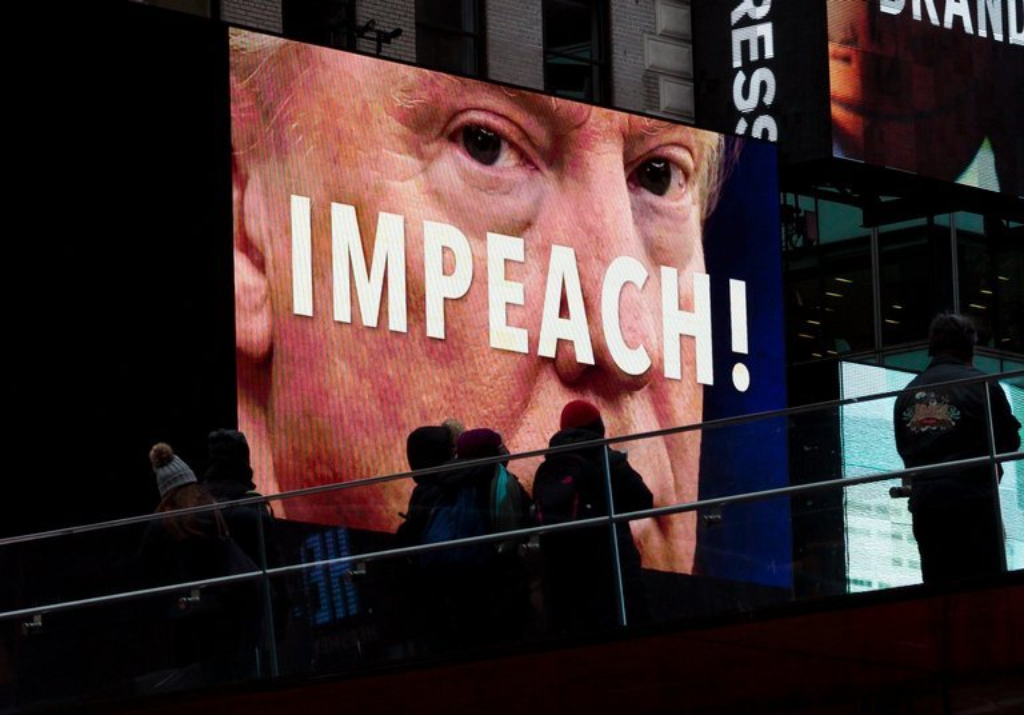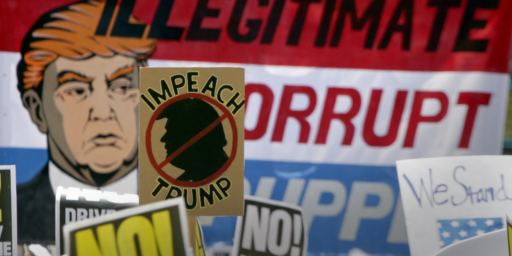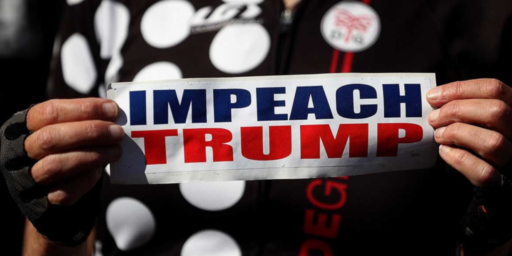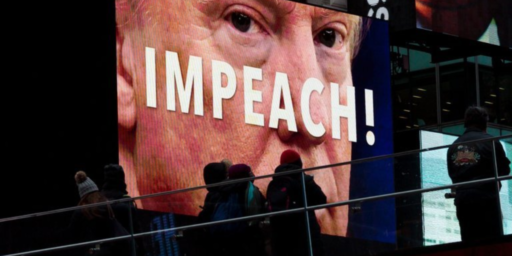House Judiciary Committee Releases Report On Trump Impeachment
The House Judiciary Committee has issued its report on the impeachment of President Trump.

Overnight, the House Judiciary Committee issued its report on the impeachment of President Donald Trump, which the full House will vote on later this week:
The House Judiciary Committee released its full report on the impeachment of President Donald Trump early Monday, ahead of consideration by the full House as early as Wednesday.
The 658-page document, issued just after midnight, is an explanation in four parts of the committee’s process and justification for recommending two articles of impeachment against Trump, abuse of power and obstruction of Congress.
The committee, led by Rep. Jerrold Nadler, D-N.Y., devotes part one to detailing the process by which the House Intelligence Committee investigated the case against Trump. Part two is dedicated to examining the standards of impeachment laid out in the Constitution.
Part three delves into the details of Democrats’ case that Trump abused the power of his office to pressure a foreign government, Ukraine’s, to investigate his domestic political rival and interfere in the 2020 presidential election.
“President Trump has realized the Framers’ worst nightmare. He has abused his power in soliciting and pressuring a vulnerable foreign nation to corrupt the next United States Presidential election by sabotaging a political opponent and endorsing a debunked conspiracy theory promoted by our adversary, Russia,” the committee wrote.
Part four makes a case that the president obstructed Congress’ ability to hold the executive branch accountable by flouting House investigators’ requests for documents and testimony.
“Other Presidents have recognized their obligation to provide information to Congress under these circumstances,” the report states. “President Trump’s stonewall, by contrast, was categorical, indiscriminate, and without precedent in American history.”
The committee concludes that Trump “has fallen into a pattern of behavior: this is not the first time he has solicited foreign interference in an election, been exposed, and attempted to obstruct the resulting investigation. He will almost certainly continue on this course.”
“For all the reasons given above, President Trump will continue to threaten the Nation’s security, democracy, and constitutional system if he is allowed to remain in office. That threat is not hypothetical,” the report states.
In a response to the Democratic findings, Doug Collins of Georgia, the ranking Republican on the committee, said the articles failed to establish any impeachable offense, arguing that “an accusation of abuse of power must be based on a higher and more concrete standard than conduct that ‘ignored and injured the interests of the Nation.'”
“The people, through elections, decide what constitutes the ‘interests of the nation,'” Collins wrote.
“It is no surprise the allegations shifted from quid pro quo, bribery, and extortion to settle on an undefined ‘abuse of power,'” according to Collins.
The minority also argued that obstruction of Congress isn’t an impeachable offense per se because “the Founders intended to create interbranch conflict.”
“The fact that conflict exists here does not mean the President has committed either a high crime or a high misdemeanor,” Collins wrote, arguing that Congress should pursue the matter in the courts
The flaw in the argument that Collins, of course, is that the Constitution makes the House of Representative the sole arbiter of what an impeachable actually is. A court challenge on this issue would likely fail on jurisdictional or standing grounds. Additionally, Collins misstates the language of the Constitution regarding impeachment, which states that impeachment can be for, among other things, “treason, bribery, or other high Crimes and Misdemeanors.” It does not make reference to “High Misdemeanors,” whatever that may be. Additionally, as Jonathan Adler at The Volokh Conspiracy makes this point, comparing attitudes like those expressed by Collins to Robert Bork’s often derided comment that the Ninth Amendment was “an inkblot” upon the Constitution:
One problem with this argument – particularly when made by folks who otherwise embrace originalist approaches to constitutional interpretation – is that it is quite anti-originalist. The phrase “High Crimes and Misdemeanors” may be less determinate than “treason,” not least because the latter is defined in the Constitution itself, but it is still a part of the constitution and is still subject to interpretation. That interpreting it and applying it may be more difficult does not mean it should not be interpreted and applied. There is no license for excising it from the Constitution or pretending it does not exist. Indeed, there are many clauses in the Constitution that, at first glance, are no less indeterminate, and yet few make the argument that they should not be relied upon.
As it happens, the framers of the Constitution actually considered a more determinate list of impeachable offenses, and expressly chose a different course. James Madison objected to the inclusion of “maladministration” as an impeachable offense, but leaving treason and bribery as the only impeachable offenses was expressly rejected at the Constitutional Convention as the delegates voted to include “other high Crimes and Misdemeanors” in Article II, Section 4. Thus to refuse to consider “other high Crimes and Misdemenaors” as impeachable offenses is to excise a portion of the constitutional text.
As it also happens, the phrase “high Crimes and Misdemeanors” was better understood at the time of ratification than some seem willing to acknowledge. Those present in Philadelphia, and at the various state ratifying convention, were familiar with the history of impeachments in England as well as in the colonies. Indeed, the impeachment trial of William Hastings was occurring while the convention was underway, and was referred to during the proceedings. It was well understood that “high Crimes and Misdemeanors” referred to the sorts of abuses that only public figures could commit, and need not be crimes defined by statute or recognized at common law. Indeed, it was also understood that a President’s misuse of core executive power, such as in the conduct of foreign affairs or through the issuance of a pardon, could constitute an impeachable act.
The precise boundaries of what constitutes a high crime or misdemeanor may not be as determinate as what constitutes treason, but it is hardly just an inkblot.
As to the President’s wrongdoing, as the report makes clear, the evidence is crystal clear. Beginning at nearly the same time that President Zelensky was elected the new President of Ukraine, the Trump Administration, at the apparent direction of the President working through his private attorney Rudy Giuliani, was seeking to put pressure on the new government. That pressure was directed at getting Zelensky to agree to launch an investigation aimed at finding compromising information about a political rival as well as information that would supposedly corroborate a discredited, Kremlin-based, conspiracy theory dealing with Ukraine’s role in the 2016 U.S. Presidential election.
When Congress authorized millions of dollars in defensive military aid for Ukraine to deal with the Russian-backed civil war taking place in the nation’s eastern region, that opportunity presented itself. Contrary to the wishes of Congress, the President placed a hold on that aide without explanation and then sought to tie the lifting of that hold and any progress with regard to the relationship between Washington and Kyiv and made clear to the aforementioned investigations. This was made clear in both the President’s July 25th phone call with President Zelensky and other communications with his government, including contact initiated by and through Giuliani. As I’ve discussed elsewhere, this constituted a violation of both the Constitutional understanding of “bribery” as that term is used in the impeachment clause and of a number of existing provisions of Federal law and fall under the abuse of power grounds set forth in the first Article of Impeachment.
The second Article of Impeachment, of course, deals with the efforts of the Trump White House to obstruct Congressional investigation not only of the Ukraine matter but of other legitimate areas of investigation. In a manner that even the Nixon Administration didn’t attempt, the Trump Administration has attempted to block Congress from current and former Administration officials as well as perfectly legitimate document requests. Each time these requests have been challenged in Court, they have been blocked at the District Court and Court of Appeals level. While those matters are now pending before the Supreme Court, the resolution of that case likely won’t come before June, right before the party conventions and the beginning of the Presidential General Election season.
All of this comes at the start of a historic week that will likely see a vote on the Articles of Impeachment themselves on Wednesday, just before the House breaks for the Christmas holiday.
Here’s the report, all 640 pages of it.
House Judiciary Committee I… by Doug Mataconis on Scribd






They charge him with Wire Fraud…that’s awesome.
Even while lying, and mis-representing the Constitution, Collins doesn’t make a very robust defense.
Still…McConnell and Graham have made it clear that, when it comes to the Senate Trial, the fix is in.
The House should not advance this case to the Senate, for trial, until that is some way rectified.
If every Republican, who has already made it clear that they are not willing to be an impartial juror, recused themselves…Democrats would likely constitute the 2/3rds majority required for removal.
Small pet peeve, the Adler article quoted above says,
The Supremes seem to have done exactly that with the “well regulated militia” clause.
So, is there such a thing as “accessory after the fact” to the various crimes we now know Trump committed? It would be so beautifully ironic to see successful criminal prosecution of the spineless ones trying to protect their own positions, even if Trump sails away unencumbered…